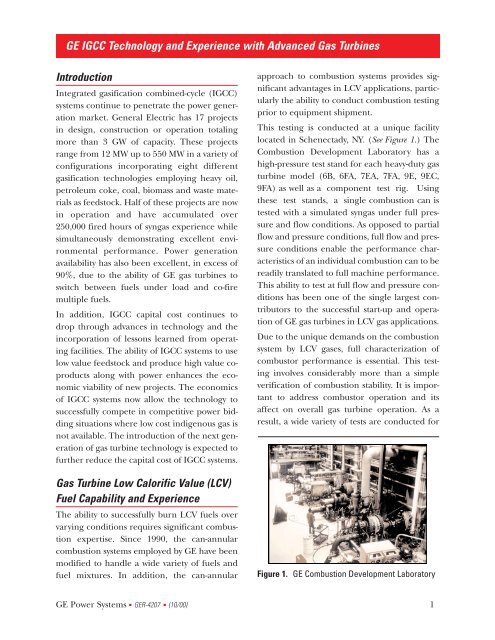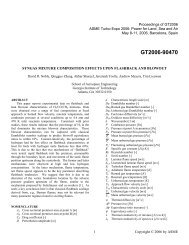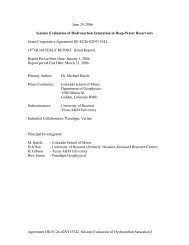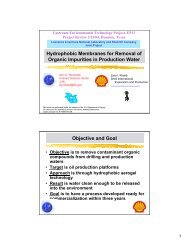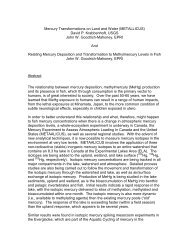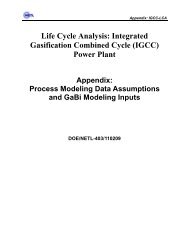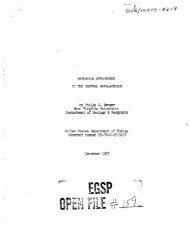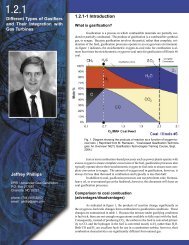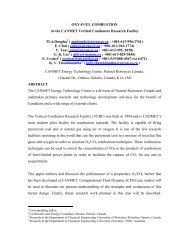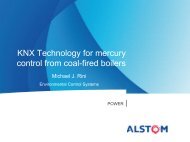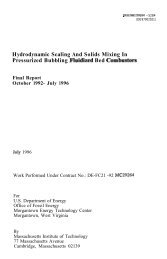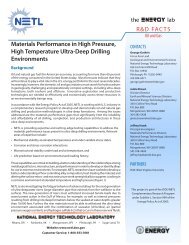GE IGCC Technology and Experience with Advanced Gas Turbines
GE IGCC Technology and Experience with Advanced Gas Turbines
GE IGCC Technology and Experience with Advanced Gas Turbines
You also want an ePaper? Increase the reach of your titles
YUMPU automatically turns print PDFs into web optimized ePapers that Google loves.
<strong>GE</strong> <strong>IGCC</strong> <strong>Technology</strong> <strong>and</strong> <strong>Experience</strong> <strong>with</strong> <strong>Advanced</strong> <strong>Gas</strong> <strong>Turbines</strong><br />
Introduction<br />
Integrated gasification combined-cycle (<strong>IGCC</strong>)<br />
systems continue to penetrate the power generation<br />
market. General Electric has 17 projects<br />
in design, construction or operation totaling<br />
more than 3 GW of capacity. These projects<br />
range from 12 MW up to 550 MW in a variety of<br />
configurations incorporating eight different<br />
gasification technologies employing heavy oil,<br />
petroleum coke, coal, biomass <strong>and</strong> waste materials<br />
as feedstock. Half of these projects are now<br />
in operation <strong>and</strong> have accumulated over<br />
250,000 fired hours of syngas experience while<br />
simultaneously demonstrating excellent environmental<br />
performance. Power generation<br />
availability has also been excellent, in excess of<br />
90%, due to the ability of <strong>GE</strong> gas turbines to<br />
switch between fuels under load <strong>and</strong> co-fire<br />
multiple fuels.<br />
In addition, <strong>IGCC</strong> capital cost continues to<br />
drop through advances in technology <strong>and</strong> the<br />
incorporation of lessons learned from operating<br />
facilities. The ability of <strong>IGCC</strong> systems to use<br />
low value feedstock <strong>and</strong> produce high value coproducts<br />
along <strong>with</strong> power enhances the economic<br />
viability of new projects. The economics<br />
of <strong>IGCC</strong> systems now allow the technology to<br />
successfully compete in competitive power bidding<br />
situations where low cost indigenous gas is<br />
not available. The introduction of the next generation<br />
of gas turbine technology is expected to<br />
further reduce the capital cost of <strong>IGCC</strong> systems.<br />
<strong>Gas</strong> Turbine Low Calorific Value (LCV)<br />
Fuel Capability <strong>and</strong> <strong>Experience</strong><br />
The ability to successfully burn LCV fuels over<br />
varying conditions requires significant combustion<br />
expertise. Since 1990, the can-annular<br />
combustion systems employed by <strong>GE</strong> have been<br />
modified to h<strong>and</strong>le a wide variety of fuels <strong>and</strong><br />
fuel mixtures. In addition, the can-annular<br />
approach to combustion systems provides significant<br />
advantages in LCV applications, particularly<br />
the ability to conduct combustion testing<br />
prior to equipment shipment.<br />
This testing is conducted at a unique facility<br />
located in Schenectady, NY. (See Figure 1.) The<br />
Combustion Development Laboratory has a<br />
high-pressure test st<strong>and</strong> for each heavy-duty gas<br />
turbine model (6B, 6FA, 7EA, 7FA, 9E, 9EC,<br />
9FA) as well as a component test rig. Using<br />
these test st<strong>and</strong>s, a single combustion can is<br />
tested <strong>with</strong> a simulated syngas under full pressure<br />
<strong>and</strong> flow conditions. As opposed to partial<br />
flow <strong>and</strong> pressure conditions, full flow <strong>and</strong> pressure<br />
conditions enable the performance characteristics<br />
of an individual combustion can to be<br />
readily translated to full machine performance.<br />
This ability to test at full flow <strong>and</strong> pressure conditions<br />
has been one of the single largest contributors<br />
to the successful start-up <strong>and</strong> operation<br />
of <strong>GE</strong> gas turbines in LCV gas applications.<br />
Due to the unique dem<strong>and</strong>s on the combustion<br />
system by LCV gases, full characterization of<br />
combustor performance is essential. This testing<br />
involves considerably more than a simple<br />
verification of combustion stability. It is important<br />
to address combustor operation <strong>and</strong> its<br />
affect on overall gas turbine operation. As a<br />
result, a wide variety of tests are conducted for<br />
Figure 1. <strong>GE</strong> Combustion Development Laboratory<br />
<strong>GE</strong> Power Systems ■ <strong>GE</strong>R-4207 ■ (10/00) 1


